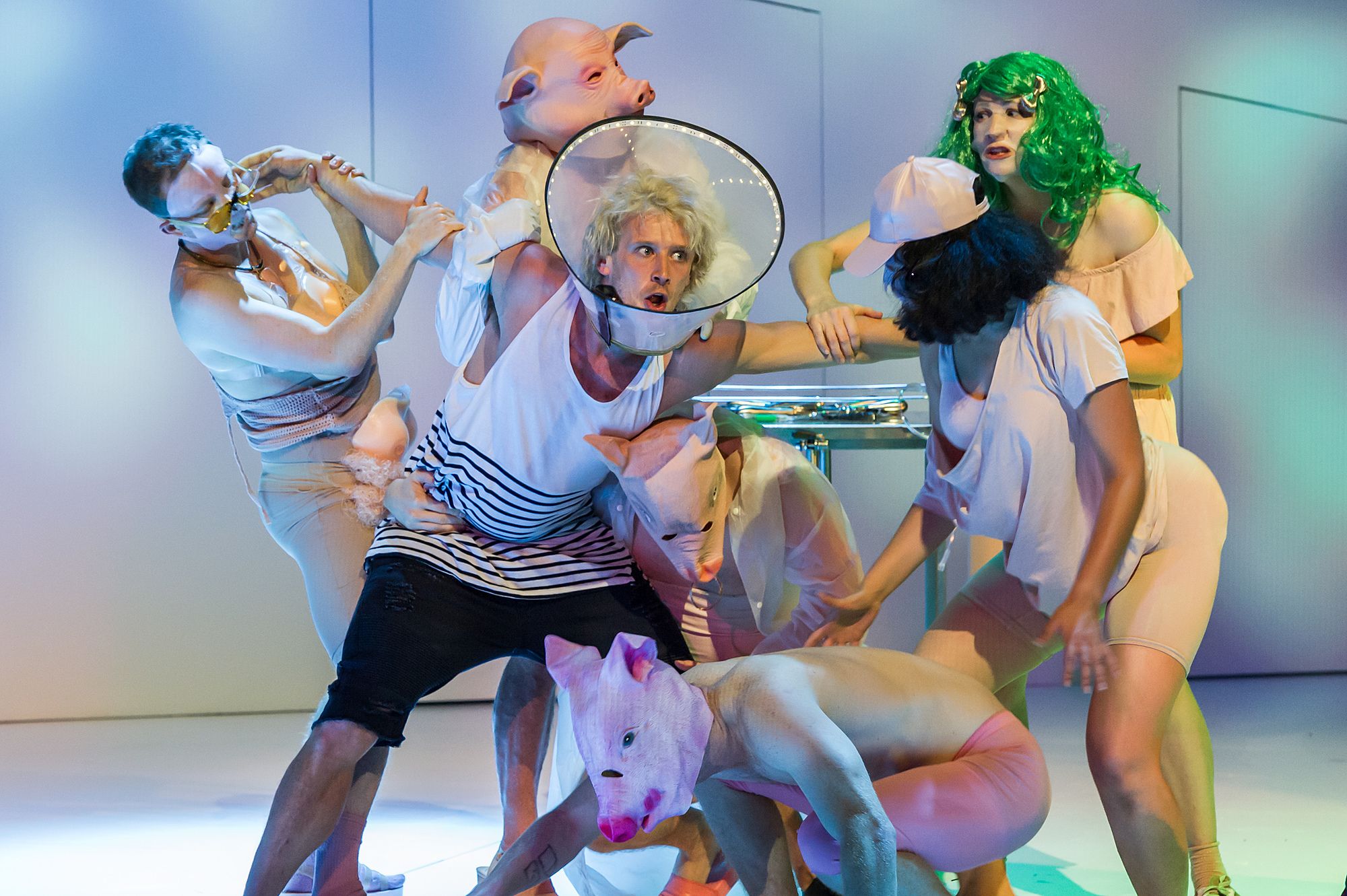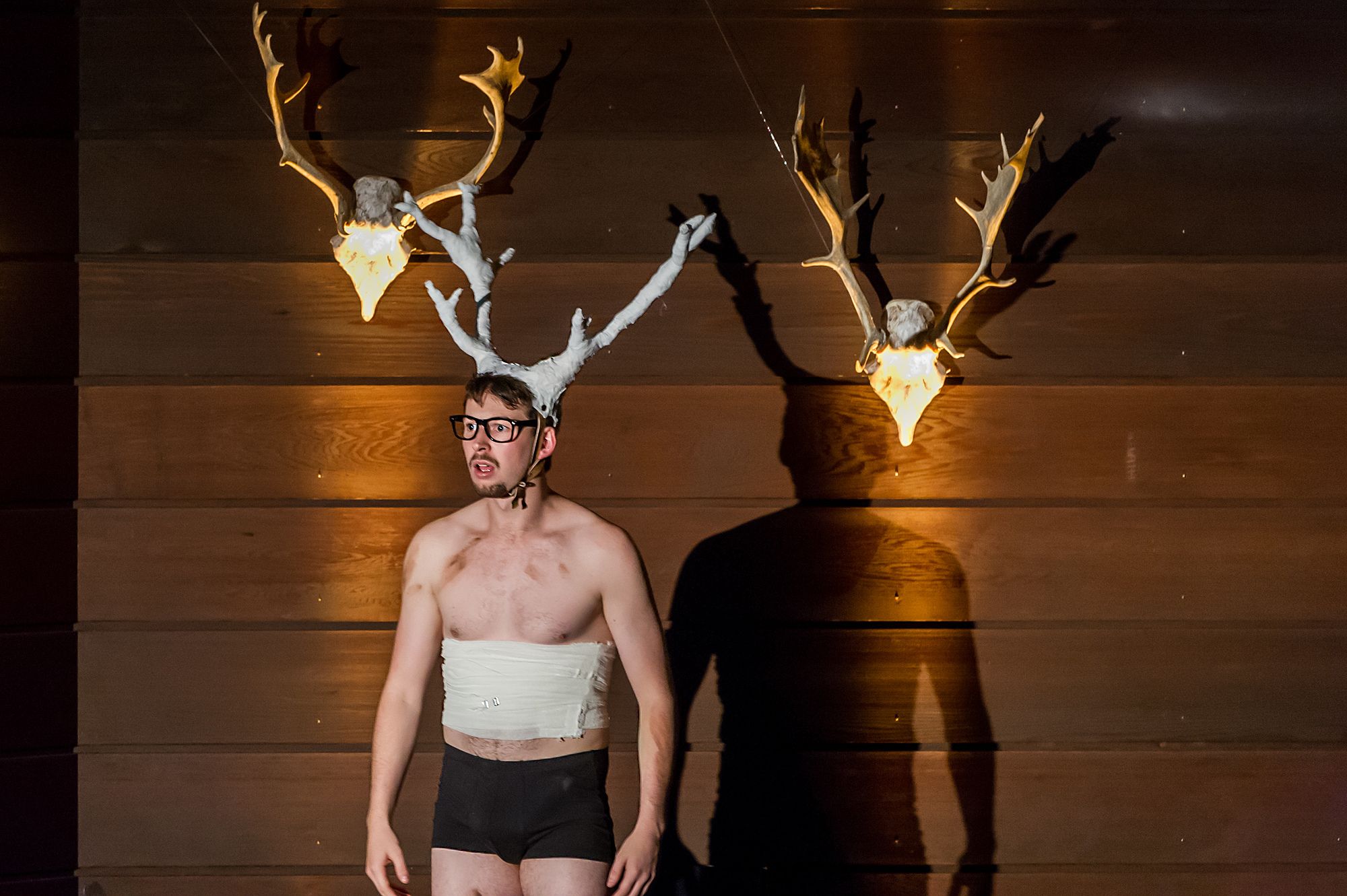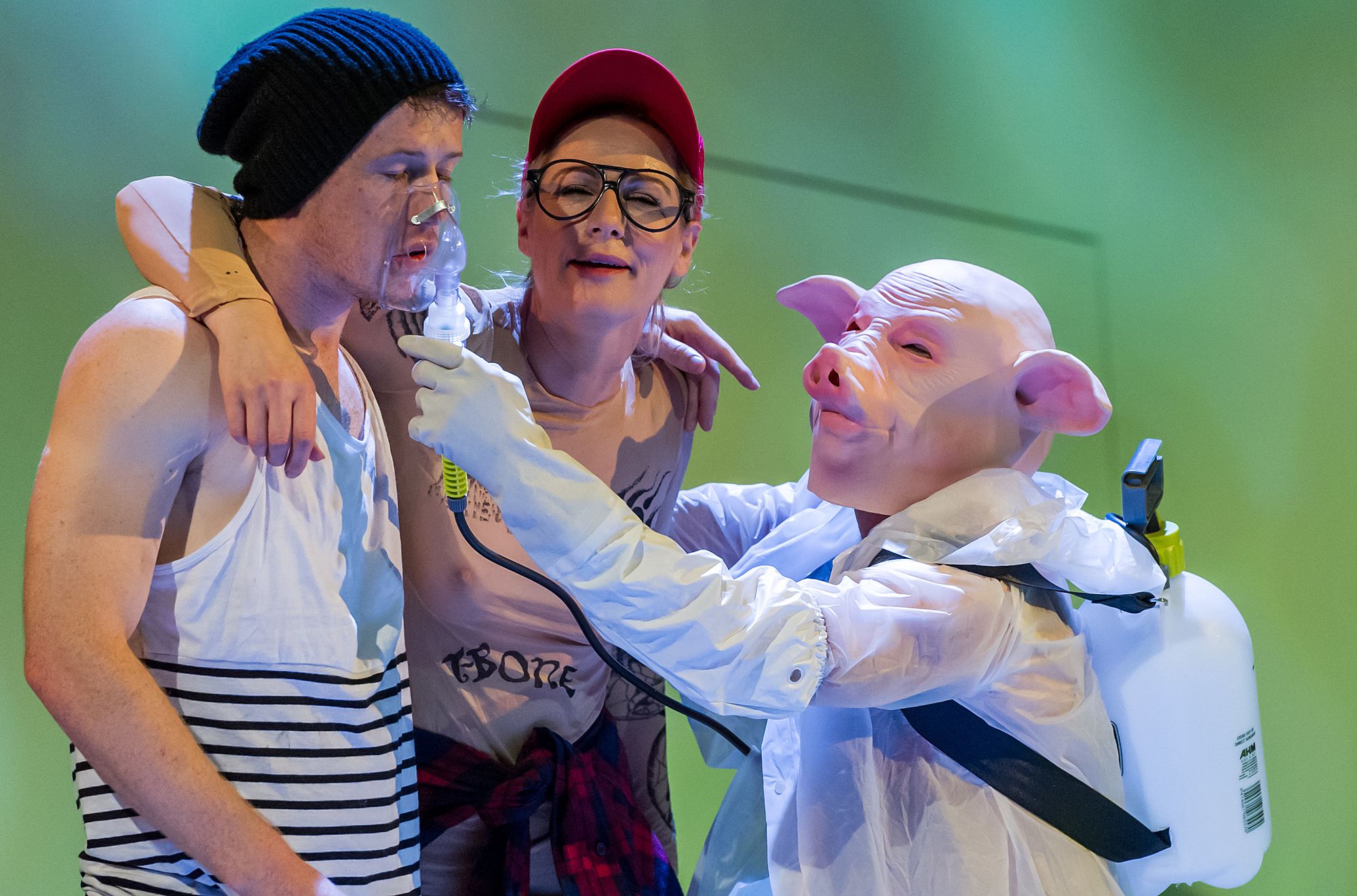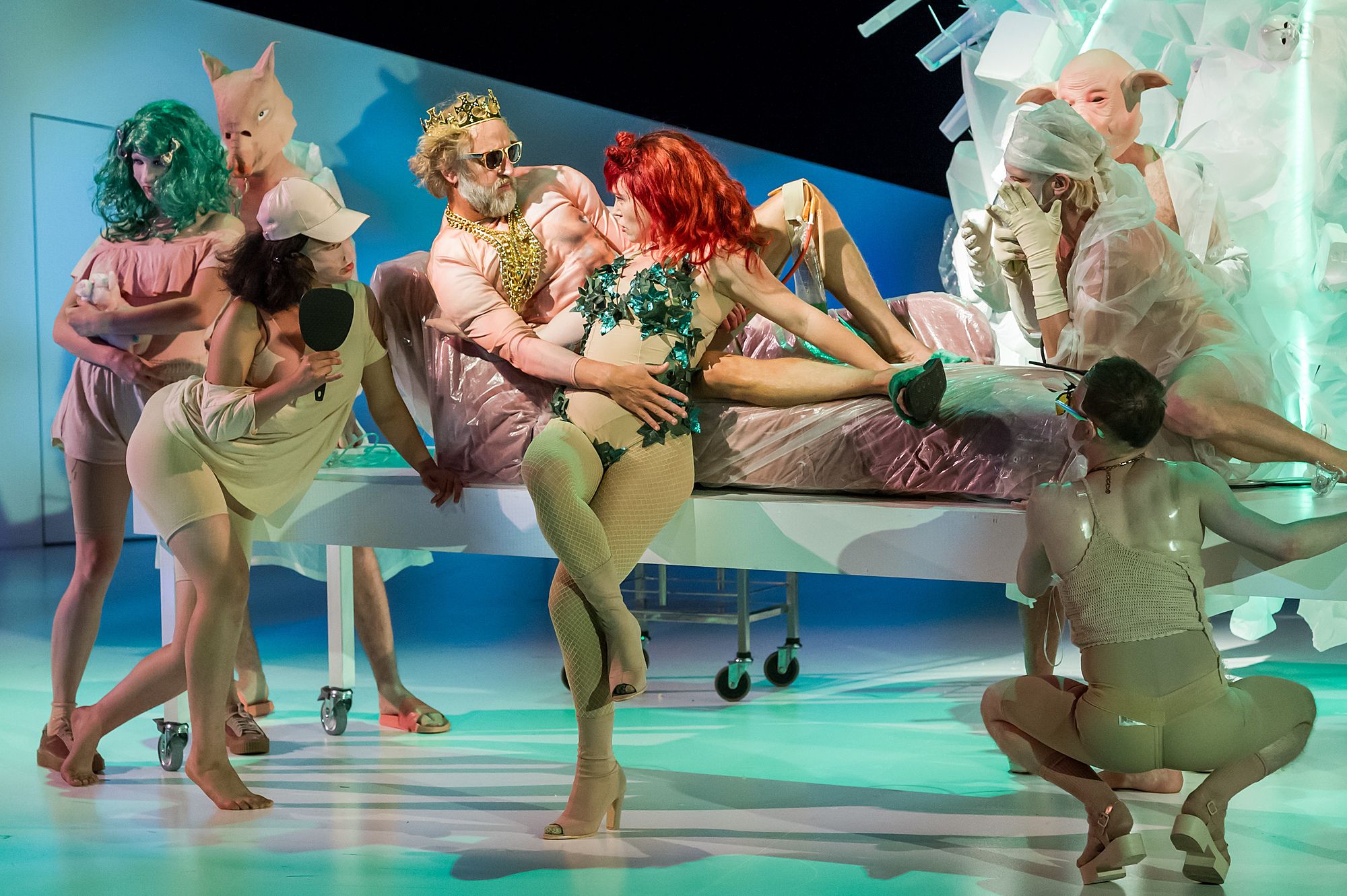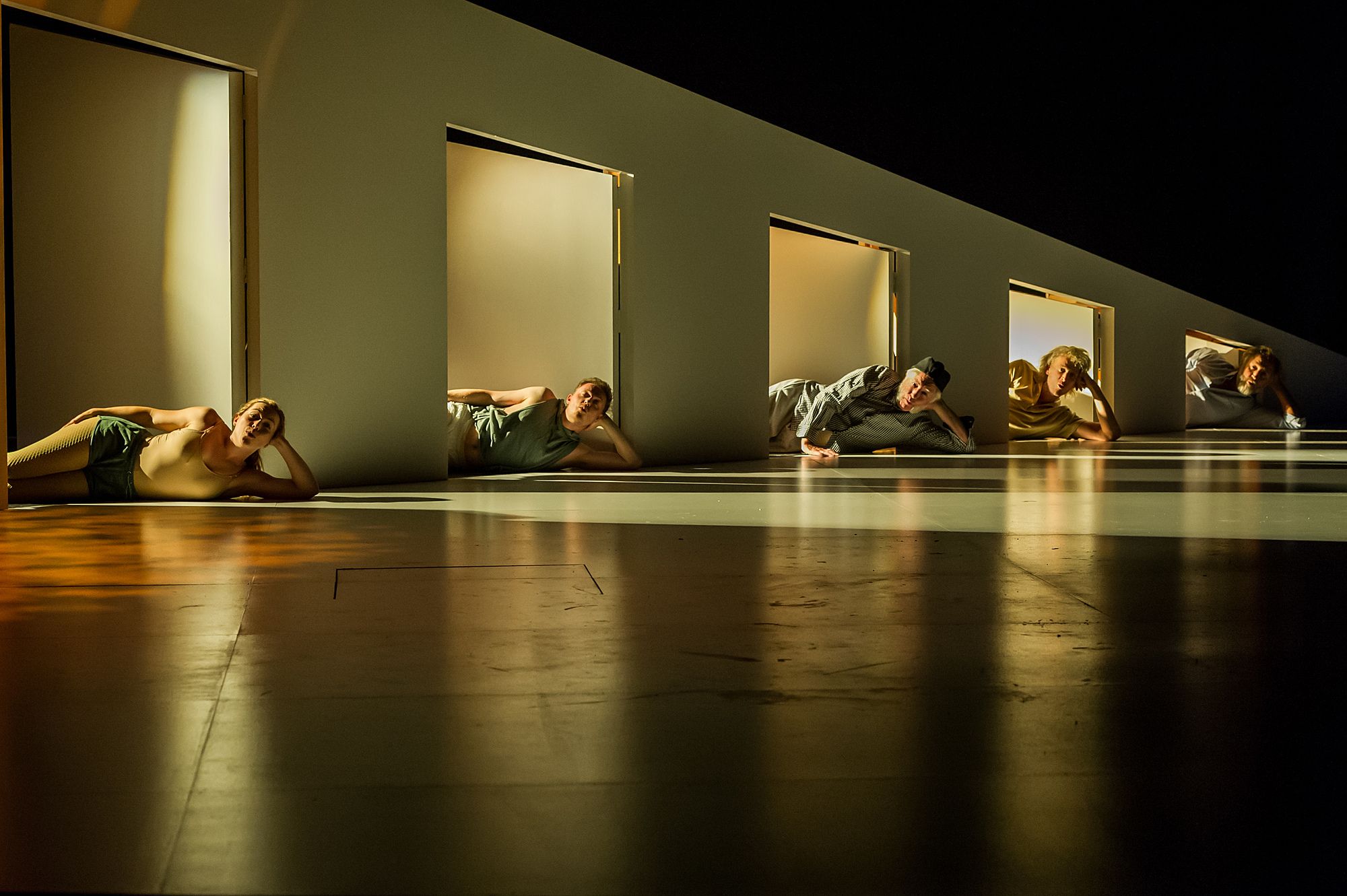Porn-on-Tap and the Father of Modern Drama: A Review of 'Peer Gynt [recycled]'
In Peer Gynt [recycled], New Zealand playwright Eli Kent and the Father of Modern Drama, Henrik Ibsen, go head-to-head
In Peer Gynt [recycled], New Zealand playwright Eli Kent and the Father of Modern Drama, Henrik Ibsen, go head-to-head in a heated exchange about the nature of adaptation and originality. It’s smart, brazen writing, but the production doesn't quite meet and wrangle with the play.
Two years ago, Auckland Theatre Company commissioned playwright Eli Kent to adapt Henrik Ibsen’s Peer Gynt. Despite ATC’s new-found keenness on pairing New Zealand writers with Ibsen, adaptations of classics are not that common in New Zealand: it’s usually the territory of the theatre auteur, and for some reason in Aotearoa we don't really do auteur. We defer less to the power of the director’s vision. That’s in contrast to Australia or the UK, where the classics are fodder for director's reimagined worlds, and audiences are used to seeing plays which often bear minimal resemblance to their original versions.
But this is a playwright’s adaptation, and a playwright’s adaptation is a different beast from a director’s. The ‘recycled’ part of the title feels right. Ibsen’s play has been repurposed to Eli’s predilections. It redresses the themes by undressing the writer. And for all the self-described “jumbling and messing around” with the original, there is in fact a lot of the essence of the original in Eli’s adaptation.
Ibsen’s original play/poem follows Peer Gynt – the hedonistic, self-obsessed empty-hero – over the span of thirty years, from his home to the mountain hall of a troll king to Egypt, and back. Peer is searching for some kind of concrete city of self but it remains a mirage. The play questions how much of our lives we construct and how much is ‘true’, and satirises our constant quest for self-satisfaction. Sure, it’s filled with some really specific 19th century Norwegian references (as the character Eli says, Ibsen’s original is “super old. And super about Norway”) and even Ibsen himself said “of all my books I regard Peer Gynt as the one least constituted to be understood outside the Scandinavian countries”. But it’s endured. From our individualistic, Western, 21st century outlook, it’s not hard to see why. Also the structure of the original is so thoroughly modern in its free-wheeling openness, there’s space enough to breathe new air into it.
This being the meta-theatrical Eli Kent, whose previous plays All Your Wants and Needs Fulfilled Forever and The Intimate Art of Actually Caring feature his fallible, often rudderless ‘self’ at the centre of the narrative, the writer has similarly duct-taped himself, directionless and struggling, into the fabric of his Peer Gynt. Peer Gynt [recycled] is about the playwright’s wrangles and fears in approaching this rambling, riotous masterwork from the Father of Modern Drama. We are at once inside Eli’s updated Peer Gynt world and looking on with him from the outside. With this self-referential scaffolding in place, the play reels back on itself through the figure of our playwright, rendering itself thick with thematic layers.
They're trying to escape themselves, but can’t get out of their own way.
Is this Eli’s growing stock-in-trade? These layers of meta-narratives, this self-referential fretting, this tricksy act of excusing his perspectival limitations by obsessing over and apologising for them in plain view? Perhaps, but it just so happens that that particular vivid thumbprint of Eli’s writing significantly enlarges the themes of self-obsession, shirking cowardice and rabid individualism in Ibsen’s original. I mean, that’s kind of the point, right: Eli, the character of the playwright (yes, let’s not confuse the ‘real’ playwright with his creation of the same name) has weighty insecurities and weighty concerns about millennial vapidity. But by giving this so much of his focus he turns weightless, made of nothing, without a moral centre, just like our modern Peer Gynt. Sure, Peer is a boisterous, wilful, party rat, and Eli a stammering, self-conscious over-thinker but they live together onstage as part of the same psyche. They're trying to escape themselves, but can’t get out of their own way.
So here it is: Eli's taken a rangy, unstageable Scandinavian masterwork and skilfully wrangled it into a commentary on the vacuum of mediated self. It’s one of the most exciting, ambitious approaches a New Zealand playwright has given to a classic. But I’m not convinced it’s been developed and produced to meet the challenges the script presents.
“Nine months ago my dick stopped working” Eli says at the start of the play. Eli’s got a porn problem, and it’s a fitting contemporary choice to bring into the world of Peer Gynt. Porn is a modern hall of mirrors; those endless tabs, that mechanical self pleasure. The whole world of the play heaves under this millennial addiction, often taken to extremes. It spawns a trip into the Hall of the Troll King (a slimy Adam Gardiner), with an orgytastic bouffonesque bevy of piggy trolls, surrounded in voyeuristic obsession by Lisa Chappell’s VICE fashion photographer (or sexual predator with a camera) Terry Richardson.
Nic Smillie really knocks the costume design out of the park in this scene – it’s repulsive and other-worldly and freakish to uncomfortable levels (the older woman next to me mutters, “This is awful. This is filthy”, but later, quietly, “This is so weird” in a way that suggests something in her enjoyed it). I want to be able to draw a clearer line between the world of Terry Richardson and the freak sex trolls (more botoxed coked-up fashion parties than green-haired trolly writhing) because this isn’t just crazy, trolly kink – the references here are towards real life dickheads who use their power for sexual exploitation. So sexual predator Terry Richardson is actually a troll. What does sexual predator Terry Richardson being a troll mean? It means the intoned mantra of the troll world, “You do you, man” takes on a whole darker meaning. I don’t know if it’s because there’s just something astonishingly jarring about seeing the miscast Chappell, a McLeod’s Daughter, with a strap-on, but for all the unnerving qualities of the troll chorus, the weight of this doesn’t land.
The older woman next to me mutters, “This is awful. This is filthy”, but later, quietly, “This is so weird” in a way that suggests something in her enjoyed it.
This sense of floating contemporary references happens again and again: when we see Milo Yiannopoulos and a very angry Starbucks employee later in the second half; when the text turns into lyrics from Michael Jackson's Billie Jean; when the cast fall into the Dawson’s Creek theme tune; and when Eli’s friend Sol says she only listens to early-era Radiohead, “nothing after OK Computer”. The script is dripping in references from a 90s childhood, and it feels like the playwright is constructing the world of the play based on the media he was raised on. All these elements of pop culture delineate an Eli-ness, which means his (ours) is a capitalistic, recycled, unoriginal personhood. It’s effectively empty. But at the moment I’m not sure that’s immediately clear. The references hang, curiously suspended in the air between Eli’s generation and the Auckland Theatre Company core audience.
The central dramatic tension in Peer Gynt [recycled] arises out of the 100+ years between Ibsen and Eli. For me this is where the play is the most strikingly compelling. But in a play laden with internet celebrity, porn-on-tap and formative 90s nostalgia, there is also a hidden tension in the 30 years between the director Colin McColl and the playwright. This is not a bad thing – different perspectives are the essential push-and-pull of any collaboration. But strangely to the contrary, that wrangle feels absent here, as if the company has approached the playwright with kid gloves, wary to stretch and test the text for its particular environment. There seems to be an acceptance that the younger generation will ‘get it’ and the regular ATC audience will be looked after by the accompanying programme’s contemporary reference glossary (“Milo Yiannopoulos is a British journalist” / “James Cameron is a Canadian director”) and synopsis (where the action is described, blow-by-blow, like the synopsis you might get in a programme for La bohème).
How long can we sit with narcissistic self-obsession before the indulgences of the character tip over into indulgences of the script?
For all it’s deconstruction, it’s also hard to feel that the script has been fully liberated from the pressure of adapting the story. In the game of holding our attention we’re already in tricky knife-edge territory – how long can we sit with narcissistic self-obsession before the indulgences of the character tip over into indulgences of the script? The second half is too long, and the play in its entirety (over three hours duration plus interval) would be strengthened by being condensed. Forty-five minutes could be sheared off, and the various modern Peer Gynt scenes (a long yoga retreat and a Dubai massacre) wouldn’t suffer from the edit. It’s frustrating to be buoyed along by a hilariously playful, ingenious, twisty first half only to be left to sit in a lukewarm and cooling bath in the second. By the lonely, empty conclusion which, just as the original, never offers a clear resolve, I was tired. And God that’s a pity, because the play is so incredibly layered, so beautifully imaginative, such a weirdly comic feast.
There are some great performances – Jack Buchanan as Eli is suitably stumbly and Peter Hayden as Ibsen is delightfully gruff, and as a very flat-vowelled New Zealand Bøyg (the best character of them all), is laugh-out-loud funny. They are joined by a strong ensemble. And those incredible Nic Smillie costumes are able to pop in all their glory on John Parker’s minimal, angled set.
Eli’s script is a giant set of toothy jumper leads. They’re latched on to the spirit of Ibsen and the concerns of our mediated 21st-century selves and more often than not the battery turns over and the car revs, but sometimes the current gets blocked. The script is about rupturing canonical adoration, but in this particular environment, any hands-off reverence seems strangely transferred to Eli’s own vivid millennial irony. It’s written with so much playfulness and ingenuity that I want nothing but the damn best for it. But company, audience and directorial environments all feed into the dramaturgy of a performance. The play needs a director and dramaturg to meet it, wrangle with it and give it a sharp kick up the arse in the second half. And if the current is blocked? Just hot-wire the car.
Peer Gynt [recycled] runs from Tuesday 7 March to Saturday 18 March
at ASB Waterfront Theatre as part of the Auckland Arts Festival
Tickets available here
